South Africa national rugby union team
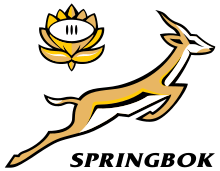 | |||
| Nickname(s) | Springboks | ||
|---|---|---|---|
| Emblem |
Springbok & Protea | ||
| Union | South African Rugby Union | ||
| Head coach | Allister Coetzee | ||
| Captain | Adriaan Strauss | ||
| Most caps | Victor Matfield (127) | ||
| Top scorer | Percy Montgomery (893) | ||
| Top try scorer | Bryan Habana (66) | ||
| |||
| World Rugby ranking | |||
| Current | 6 (as of 28 November 2016) | ||
| Highest | 1 (2009) | ||
| Lowest | 6 (2015) | ||
| First international | |||
|
South Africa 0–4 British Isles (Cape Town, South Africa; 30 July 1891) | |||
| Biggest win | |||
|
South Africa 134–3 Uruguay (East London, South Africa; 11 June 2005) | |||
| Biggest defeat | |||
|
England 53–3 South Africa (London, England; 23 November 2002) | |||
| World Cup | |||
| Appearances | 6 (First in 1995) | ||
| Best result | Champions, 1995, 2007 | ||
| Website | www.sarugby.co.za | ||
The South Africa national rugby union team, commonly known as the Springboks, is governed by the South African Rugby Union. The Springboks play in green and gold jerseys with white shorts, and their emblems are the Springbok and the King Protea. The team has been representing South Africa in international rugby union since 30 July 1891, when they played their first test match against a British Isles touring team.
Although South Africa was instrumental in the creation of the Rugby World Cup competition, the Springboks did not compete in the first two World Cups in 1987 and 1991 because of anti-apartheid sporting boycotts of South Africa. The team made its World Cup debut in 1995, when the newly democratic South Africa hosted the tournament. The Springboks defeated the All Blacks 15–12 in the final, which is now remembered as one of the greatest moments in South Africa's sporting history, and a watershed moment in the post-Apartheid nation-building process. South Africa regained their title as champions 12 years later, when they defeated England 15–6 in the 2007 final. As a result of the 2007 World Cup tournament the Springboks were promoted to first place in the IRB World Rankings, a position they held until July the following year when New Zealand regained the top spot. They were named 2008 World Team of the Year at the Laureus World Sports Awards.[1]
The Springboks also compete in the annual Rugby Championship (formerly the Tri-Nations), along with southern-hemisphere counterparts Argentina, Australia and New Zealand. They have won this championship on three occasions in sixteen years. They also play Test matches against the various rugby-playing nations. Their position in the World Rugby Rankings has varied between the No. 1 and No. 6 positions.
History
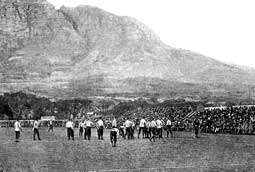
First internationals: 1891–1913
The first British Isles tour took place in 1891, at Diocesan College.[2] These were the first representative games played by South African sides. The tourists won all twenty matches they played, conceding only one point.[3][4] The British Isles' success continued on their tour of 1896, winning three out of four tests against South Africa. South Africa's play improved markedly from 1891, and their first test win in the final game was a pointer to the future.[5][6] In 1903 the British Isles lost a series for the first time in South Africa, drawing the opening two tests before losing the last 8–0.[7][8] Rugby was given a huge boost by the early Lions tours, which created great interest in the South African press.[9] South Africa would not lose another series—home or away—until 1956.[10]

The first South African team to tour the British Isles and France occurred during 1906–07. The team played tests against all four Home Nations. England managed a draw, but Scotland was the only one of the Home unions to gain a victory.[11] The trip instilled a sense of national pride among South Africans.[10][12] The South Africans played an unofficial match against a 'France' team while the official French team were in England; the Springboks won 55–6.[13][14] It was during this tour that the nickname Springboks was first used.[15][16][17]
The 1910 British Isles tour of South Africa was the first to include representatives from all four Home unions. The tourists won just one of their three tests.[18]
The Boks' second European tour took place in 1912–13. They beat the four Home nations to earn their first Grand Slam, and also defeated France.[10][19]
Inter war
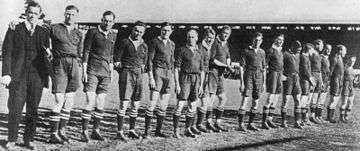
By the first World War, New Zealand and South Africa had established themselves as rugby's two greatest powers.[20][21] A Springbok tour to New Zealand and Australia in 1921 was billed as "The World Championship of Rugby".[22] The All Blacks won the first Test 13–5,[23] The Springboks recovered to win the second Test 9–5,[23] and the final Test was drawn 0–0, resulting in a series draw.[24]
The 1924 British and Irish Lions team to South Africa lost all four Tests to the Springboks.[25][26] This was the first side to pick up the name Lions, apparently picked up from the Lions embroidered on their ties.[27][28] The All Blacks first toured South Africa in 1928, and again the Test series finished level. The Springboks won the first Test 17–0 to inflict the All Blacks' heaviest defeat since 1893.[29][30] The All Blacks rebounded to win the second Test 7–6. After a Springbok win in the third Test, the All Blacks won 13–5 to draw the series.[31]
Despite winning South Africa's second Grand Slam, the Springbok tourists of 1931–32 were an unloved team, due to their tactics of kicking for territory.[32][33] It was successful however, winning against England, Ireland, Scotland and Wales, as well as defeating all their Welsh opponents for the first time.[34]
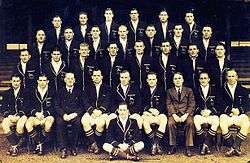
In 1933, Australia toured South Africa, with the Springboks winning the series 3–2.
In 1937 South Africa toured New Zealand and Australia and their 2–1 series win prompted them to be called "the best team to ever leave New Zealand".[35][36]
The British Isles toured South Africa again in 1938, winning the majority of their tour matches. The Springboks secured easy victories in the first two tests. However, the Lions bounced back to record a win in the third test, for the first Lions win on South Africa soil since 1910.[37]
Post-war era
Danie Craven was appointed coach in 1949, and started his coaching career winning ten matches in a row, including a 4–0 whitewash of New Zealand on their 1949 tour to South Africa.[38]
The 1951–52 team that toured Europe was considered amongst the finest Springbok sides to tour.[19] The team won the Grand Slam as well as defeating France. Hennie Muller captained the side. The South African highlight of the tour was a 44–0 defeat of Scotland.[32][39] The team finished with only one loss, to London Counties, from 31 matches.[40]
In 1953, Australia toured South Africa for the second time and although they lost the series they defeated South Africa 18–14 in the second test. This was the first Springbok defeat for 15 years. The 1955 British Lions tour to South Africa four-test series ended in a draw.
In 1956, Springboks toured Australasia the All Blacks won its first series over the Springboks, in "the most bitterly fought series in history."[41][42]
When France toured South Africa in 1958 they were not expected to compete.[43] France exceeded expectations and drew 3–3.[44] The French then secured a Test series victory with a 9–5 victory.[45]
Anti-apartheid protests: 1960s–1970s
In 1960, international criticism of apartheid grew in the wake of The Wind of Change speech and the Sharpeville massacre.[46] The Springboks increasingly became the target of international protest. The All Blacks toured South Africa in 1960, despite a 150,000 signature petition opposing it.[47] The Springboks avenged their 1956 series defeat by winning the four-match test series 2–1 with one draw.[42][48] Later that same year the Springboks toured Europe, and they defeated all four Home unions for their fourth Grand Slam.
The 1962 British Lions tour to South Africa lost all three tests. In 1963 the touring Wallabies beat the Springboks in consecutive tests, the first team to do so since the 1896 British team. In 1964, in Wales' first overseas tour they played one test match against South Africa, losing 24–3, their biggest defeat in 40 years.[49][50][51]
South Africa had a poor year in 1965, losing matches in a tour of Ireland and Scotland, and in a tour of Australia and New Zealand.
The planned 1967 tour by the All Blacks was cancelled by the New Zealand Rugby Football Union after the South African government refused to allow Maori players.[52] In 1968 the Lions toured and lost three Tests and drew one.
Next year in the 1969–70 Springbok tour to Britain and Ireland the Springboks lost test matches against England and Scotland, and drew against Ireland. Throughout the tour however, large anti-apartheid demonstrations meant that several matches had to be played behind barbed wire fences.
In 1970 the All Blacks toured South Africa once again—after the South African government agreed to treat Maoris in the team and Maori spectators as 'honorary whites'.[53][54] The Springboks won the test series 3–1.
In the Springbok tour of Australia in 1971, the Springboks won all three tests. As in Britain three years before, however, massive anti-apartheid demonstrations greeted the team, and they had to be transported by the Royal Australian Air Force after the trade unions refused to service planes or trains transporting them. A planned tour of New Zealand for 1973 was blocked by New Zealand Prime Minister Norman Kirk on the grounds of public safety.[55]
The Lions team that toured South Africa in 1974 triumphed 3–0 (with one drawn) in the test series. A key feature was the Lions' infamous '99 call'. Lions management had decided that the Springboks dominated their opponents with physical aggression, so decided "to get their retaliation in first". At the call of '99' each Lions player would attack their nearest rival player. The "battle of Boet Erasmus Stadium" was one of the most violent matches in rugby history.[56]
Sporting isolation: 1970s–1980s
The 1976 All Blacks tour of South Africa went ahead, and the Springboks won by three Tests to one, but coming shortly after the Soweto riots the tour attracted international condemnation. Twenty eight countries boycotted the 1976 Summer Olympics in protest, and in 1977 the Gleneagles Agreement discouraged any Commonwealth sporting contact with South Africa. In response to the growing pressure, the segregated South African rugby unions merged in 1977. A planned 1979 Springbok tour of France was blocked by the French government.
The Lions toured South Africa in 1980, losing the first three tests before winning the last one.
The 1981 Springbok tour of New Zealand went ahead in defiance of the Gleneagles Agreement. South Africa lost the series 2–1. The tour and the massive civil disruption in New Zealand had ramifications far beyond rugby. In 1981, Errol Tobias became the first non-white South African to represent his country when he took the field against Ireland. South Africa sought to counteract its sporting isolation by inviting the South American Jaguars to tour. The team contained mainly Argentinian players. Eight matches were played between the two teams in the early 1980s—all awarded Test status. In 1984, England toured losing both test matches; of the players selected, only Ralph Knibbs of Bristol refused to tour for political reasons.
Due to the isolation from apartheid, from 1985 to 1991, South Africa did not play a single test match against an established country, although South Africa did play some matches against makeshift teams.[57] In 1985, a planned All Black tour of South Africa was stopped by the New Zealand High Court. A rebel tour took place the next year by a team known as the Cavaliers, which consisted of all but two of the original squad.[58] The Springboks won the series 3–1. In 1989, a World XV sanctioned by the International Rugby Board went on a mini-tour of South Africa; all traditional rugby nations bar New Zealand supplied players to the team. South Africa was not permitted by the International Rugby Board to compete in the inaugural 1987 Rugby World Cup, nor in the following 1991 Rugby World Cup.
Rainbow nation and 1995 World Cup
Apartheid was abolished during 1990–91, and the Springboks were readmitted to international rugby in 1992. They struggled to return to their pre-isolation standards in their first games after readmission. During the 1992 All Blacks tour, the first to South Africa since 1976, the Springboks were defeated 27–24 by New Zealand, and suffered a 26–3 loss to Australia the following month.
South Africa hosted the 1995 Rugby World Cup, with a surge of support for the Springboks among the white and black communities behind the slogan "one team, one country."[59] This was the first major international sports event to be held in the Rainbow Nation. By the time they hosted the 1995 World Cup, the Springboks, coached by Kitch Christie, were seeded ninth. They won their pool by defeating Australia, Romania, and Canada. Wins in the quarterfinal against Western Samoa (42–14) and in the semifinal against France (19–15) sent the Springboks to the final. South Africa won the 1995 Rugby World Cup Final against the All Blacks 15–12 in extra-time.[60][61][62][63][64] President Nelson Mandela, wearing a Springbok shirt, presented the trophy to captain Francois Pienaar, a white Afrikaner. The gesture was widely seen as a major step towards the reconciliation of white and black South Africans. The combined exploits of Mandela and the Springboks in helping unify the country through rugby union was later chronicled in John Carlin's book Playing the Enemy: Nelson Mandela and the Game that Made a Nation, which in turn inspired Clint Eastwood's 2009 Academy Award-nominated film Invictus starring Matt Damon as Pienaar and Morgan Freeman as Mandela.
A series of crises followed in 1995 through 1997. Christie resigned in 1996 due to leukaemia. South Africa struggled in the new Tri-Nations competition, the All Blacks won a test series in South Africa for the first time in 1996,[65] and the Lions won their 1997 South African tour test series two games to one. Coach Andre Markgraaff was fired in 1997 over a racial comment he made. The team suffered successive defeats in the Lions 1997 tour and the 1997 Tri Nations Series.
In 1997, coach Nick Mallett coached South Africa's unbeaten 1997 tour of Europe, and in 1998 the Boks tied the then-existing record for longest test winning streak, winning 17 consecutive tests, including the 1998 Tri-Nations.[66] At the 1999 Rugby World Cup the Springboks reached the semi-finals of the competition, where they lost to eventual champions Australia.[67]

During the 2002 and 2003 seasons, the Springboks lost by record margins to England (53–3), France, Scotland and New Zealand.[68][69] At the 2003 Rugby World Cup, they were eliminated in the quarter final round – their worst showing to date.
Following wins during the June 2004 tours, the Boks won the 2004 Tri Nations Series. The Springboks won the 2004 IRB International Team of the Year award. The Springboks finished second in the 2005 Tri-Nations.
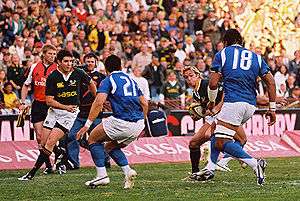
The 2006 Springboks lost to France, ending their long undefeated home record. A poor 2006 Tri Nations Series included two losses to the Wallabies. Coach Jake White told the press in July 2006 that he had been unable to pick some white players for his squad "because of transformation"—a reference to the ANC government's policies to redress racial imbalances.
2007 Rugby World Cup victory

At the 2007 Rugby World Cup in France, the Springboks won their pool. The Springboks then defeated Fiji 37–20 in the quarterfinals, and Argentina 37–13 in the semi-finals. In the final they prevailed 15–6 over England to lift the Webb Ellis Cup for a second time.
In January 2008, Peter de Villiers was appointed as the first non-white coach of the Springboks. De Villiers's first squad included ten of colour. The team finishes last in the Tri Nations, but notched several wins during their 2008 end of year tour.
The 2009 season was more successful. The Boks earned a 2–1 series win over the Lions, and then won the 2009 Tri Nations Series. However, during the November tests they lost their top spot in the IRB rankings with losses to France and Ireland. Nonetheless, the Boks were named IRB International Team of the Year.
The Boks' June 2010 test campaign included a win over France (their first victory over the French since 2005).[70] However, the Boks performed poorly in the 2010 Tri Nations campaign, sliding to third in the world rankings.[71] In the 2011 Tri Nations the Boks rested a number of players in preparation for the upcoming World Cup. At the 2011 Rugby World Cup, the Springboks topped their group before falling to Australia 11–9 in the quarter-final.
Apartheid and transformation
Even before the apartheid laws were introduced to South Africa in 1948 the Springboks had been an all-white team. The team became a symbol of racial division within South Africa, and following the first open elections in 1994, the ruling African National Congress (ANC) instituted a policy of transformation in South African sport. In this context transformation can be defined as "a complete alternation of the appearance or character of South African rugby", and one aim is to transform the Springboks into a team more representative of South Africa's race and class.[72]
South Africa's World Cup winning side of 1995 fielded only one non-white player (Chester Williams). This continued in the team's biggest matches of the 1999 and 2003 World Cups, and in the 2007 World Cup final the team fielded two non-white players (Bryan Habana and JP Pietersen).[73] South African Rugby Union president Oregan Hoskins considered the number of non-white players in the 2007 World Cup squad too low,[73] and in 2008 the first non-white coach of the side was appointed. The political pressure on rugby coaches and administrators to select non-white players is strong; 16 of the 35 new Springboks appointed by former coach Jake White were non-white.[73] ANC Minister of Parliament Butana Komphela expressed a view held by many politicians in the country when he said "Sport cannot be excluded from imperatives of empowerment and transformation."[73] Currently, 15 of the 49 players in training for the World Cup are non-white.
Controversy over the emblem
Since the demise of apartheid the ruling African National Congress has wanted to replace the Springbok across all national teams, as emblem of the racially segregated sporting codes, with a neutral symbol that would represent a decisive break with a repressive past. The King Protea as South Africa's national flower was chosen for this purpose, so that the national cricket team became known as the Proteas, for example. A similar change was envisioned for the national rugby squad's springbok emblem. Paul Roos's team had first introduced the Springbok in 1906, and it had promoted a measure of unity among white English and Afrikaans-speaking players after the two Anglo-Boer Wars of the late 19th century.[74]
The Springbok was regarded as representing both the exclusion of players who were not designated white under apartheid legislation and, by extension, of apartheid itself.[75] Although the Springbok was adopted briefly by the first coloured national rugby team in 1939 and by their first black counterparts in 1950, it became exclusively associated with segregated sporting codes afterwards. South African rugby officials in particular, and the national rugby team itself, have an historical association with racism from 1906 on. The first rugby Springboks initially refused to play against a Devon side that included Jimmy Peters, the first black player to represent England.[76] Legendary official, national coach, and Springbok scrumhalf Danie Craven had acquiesced with government officials who had demanded that Māori players be excluded from visiting All Black teams.[77] Craven had also indicated that the Springbok was exclusively tied to the white identity of the national rugby team.[75]
As a result of political pressure the national rugby team jersey from 1992 on featured a king protea alongside the springbok. As portrayed in the film Invictus, pressure to replace the Springbok as emblem for the rugby team came to a head in 1994, just before the Rugby World Cup that would take place in South Africa. As a result of Nelson Mandela's direct interference, the ANC's executive decided not to do away with the emblem at the time, but to reappropriate it. After the national team won the 1995 Rugby World Cup, black rugby pioneer Dan Qeqe said that "The Springboks play for all of us".[74]
In March 2004 the South African Sports Commission ratified a decision that the protea be the official rugby emblem on blazers and caps, with the concession that the springbok could remain on the team jersey and the traditional Springbok colours.[78] And in November 2007 the ANC's special conference at Polokwane again endorsed the need for a single symbol for all sporting codes. While critics like Qondisa Ngwenya foresaw a loss of revenue from dumping the springbok emblem,[74] others like Cheeky Watson urged the need for an alternative, unifying symbol.[79] In 2015 for the 2015 Rugby World Cup, the springbok was moved from the front of the jersey to the right sleeve while the Protea remained on the front. This was due to World Cup regulations stating that only the IRB logo and the main team logo could go on the front of the shirt. Several South African rugby fans voiced their disappointment and anger at the reveal of the 2015 shirt as a result of the springbok not being on the front of the shirt.[80]
Jersey
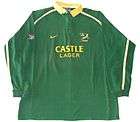
South Africa play in green jerseys with a gold collar and trim, white shorts and green socks. The jersey is embroidered with the SA Rugby logo on the wearer's left chest and the springbok logo on the right chest. The jersey is made by ASICS and their current shirt sponsor is South African telecom company Blue Label Telecoms
Historically, the green jersey was first adopted when the British Isles toured South Africa in 1896.[81] On their first tour to Great Britain and Ireland in 1906–07 South Africa wore a green jersey with white collar, blue shorts, and blue socks taken from the Diocesan College rugby kit at the time. A replica shirt was worn in 2006 against Ireland in Dublin to mark the centenary of the tour.[82] When Australia first toured South Africa in 1933, the visitors wore sky blue jerseys to avoid confusion, as at the time, both wore dark green jerseys. In 1953, when Australia toured again, the Springboks wore white jerseys for the test matches. In 1961 Australia changed their jersey to gold to avoid further colour clashes.[83]
The Springbok nickname and logo also dates from the 1906–7 tour of Britain. The springbok was chosen to represent the team by tour captain Paul Roos in an attempt to prevent the British press from inventing their own name. The logo was not restricted to the white team alone – the first coloured national team used the springbok in 1939 and the first black team in 1950.[81] After the fall of apartheid in 1992 a wreath of proteas was added to the logo. When the ANC was elected in 1994 the team's name was not changed to the Proteas, like that of other South African sporting teams, only because of the intervention of President Nelson Mandela.[81][84]
In December 2008, the SARU decided to place the protea on the left side of the Boks' jersey, in line with other South African national teams, and move the springbok to the right side of the jersey.[85] The new jersey was worn for the first time during the British and Irish Lions' 2009 tour of South Africa.[86]
| Period | Kit manufacturer | Shirt sponsor |
|---|---|---|
| 1992–1996 | Cotton Traders | Lion Lager |
| 1996–1999 | Nike | No shirt sponsor |
| 2000–2003 | Castle Lager* | |
| 2004 mid-year internationals | None | |
| 2004 Tri-Nations | Canterbury | |
| December 2004 – 2010 | SASOL | |
| 2011–2013 | Absa | |
| 2014–2015 | Asics | |
| 2016 mid-year internationals | Blue Label Telecoms |
* In a 2001 autumn international against France in Saint-Denis, the logo on their kit was replaced by Charles because of the Evin law, which prohibits alcohol companies from advertising during sports events in France.
Home grounds
The Springboks do not use a national stadium as their home, but play out of a number of venues throughout South Africa. The 60,000 seat Ellis Park Stadium in Johannesburg was the main venue for the 1995 World Cup,[87] where the Springboks defeated the All Blacks in the final. Other regular venues for tests include Pretoria's Loftus Versfeld Stadium, Newlands Stadium in Cape Town, Kings Park Stadium in Durban, Free State Stadium in Bloemfontein, and Nelson Mandela Bay Stadium in Port Elizabeth.[88] The Springboks played their first test match at Soccer City on 21 August 2010, a Tri Nations match against New Zealand.[89]
Other stadiums which have been used for test matches include Buffalo City Stadium in East London, the Royal Bafokeng Sports Palace outside of Rustenburg, Mbombela Stadium in Nelspruit and Puma Stadium in Witbank.
The first South African international took place at Port Elizabeth's St George's Park Cricket Ground in 1891.[90] Ellis Park was built in 1928, and in 1955 hosted a record 100,000 people in a Test between South Africa and the British and Irish Lions.[87]
The Springboks are said to have a notable advantage over touring sides when playing at high altitude on the Highveld.[91] Games at Ellis Park, Loftus Versfeld, or Vodacom Park are said to present physical problems,[92][93] and to influence a match in a number of other ways, such as the ball travelling further when kicked.[94] Experts disagree on whether touring team's traditionally poor performances at altitude are more due to a state of mind rather than an actual physical challenge.[93]
Records
| Top 30 rankings as of 5 December 2016[95] | |||
| Rank | Change* | Team | Points |
| 1 | 94.78 | ||
| 2 | 89.84 | ||
| 3 | 86.97 | ||
| 4 | 84.62 | ||
| 5 | 82.55 | ||
| 6 | 81.79 | ||
| 7 | 80.67 | ||
| 8 | 80.13 | ||
| 9 | 79.91 | ||
| 10 | 76.46 | ||
| 11 | 74.22 | ||
| 12 | 74.14 | ||
| 13 | 72.47 | ||
| 14 | 71.94 | ||
| 15 | 71.25 | ||
| 16 | 69.36 | ||
| 17 | 64.66 | ||
| 18 | 63.95 | ||
| 19 | 63.25 | ||
| 20 | 62.78 | ||
| 21 | 60.66 | ||
| 22 | 60.17 | ||
| 23 | 59.28 | ||
| 24 | 58.99 | ||
| 25 | 56.97 | ||
| 26 | 56.87 | ||
| 27 | 56.50 | ||
| 28 | 55.50 | ||
| 29 | 55.08 | ||
| 30 | 54.93 | ||
| *Change from the previous week | |||
| South Africa's historical rankings | |||
 | |||
| Source: World Rugby - Graph updated to 5 December 2016[95] | |||
List of South Africa national rugby union team records
Rugby Championship
South Africa's only annual tournament is The Rugby Championship (formerly Tri-Nations), involving Australia and New Zealand since 1996, with Argentina joining the competition in 2012. South Africa has won the tournament three times; in 1998 and 2004 and 2009. South Africa also participates in the Mandela Challenge Plate with Australia, and the Freedom Cup with New Zealand as part of the Rugby Championship.
| Tri Nations (1996–2011) | ||||||||||
|---|---|---|---|---|---|---|---|---|---|---|
| Nation | Games | Points | Bonus points |
Table points |
Championships | |||||
| played | won | drawn | lost | for | against | diff | ||||
| 72 | 50 | 0 | 22 | 1936 | 1395 | +541 | 32 | 232 | 10 | |
| 72 | 29 | 1 | 42 | 1531 | 1721 | −190 | 34 | 152 | 3 | |
| 72 | 28 | 1 | 43 | 1480 | 1831 | −351 | 24 | 138 | 3 | |
| Rugby Championship (2012– ) | ||||||||||
|---|---|---|---|---|---|---|---|---|---|---|
| Nation | Games | Points | Bonus points |
Table points |
Championships | |||||
| played | won | drawn | lost | for | against | diff | ||||
| 27 | 24 | 1 | 2 | 890 | 421 | +469 | 17 | 115 | 4 | |
| 27 | 13 | 1 | 13 | 553 | 662 | −109 | 5 | 59 | 1 | |
| 27 | 12 | 1 | 14 | 639 | 604 | +35 | 12 | 62 | 0 | |
| 27 | 3 | 1 | 23 | 466 | 861 | −395 | 9 | 23 | 0 | |
Updated: 10 October 2016
Source: espnscrum.com
World Cup
South Africa did not participate in the 1987 and 1991 World Cups because of the sporting boycott that apartheid brought against them. South Africa's introduction to the event was as hosts. They defeated defending champions Australia 27–18 in the opening match, and went on to defeat the All Blacks 15–12 after extra time in the 1995 Rugby World Cup Final, with a drop goal from 40 metres by Joel Stransky.[96]
In 1999 South Africa suffered their first World Cup loss when they were defeated 21–27 by Australia in their semi-final; they went on to defeat the All Blacks 22–18 in the third-fourth play-off match.[97] The worst ever South African performance at a World Cup was in 2003 when they lost a pool game to England, and then were knocked out of the tournament by the All Blacks in their quarter-final.[98] In 2007 the Springboks defeated Fiji in the quarter-finals and Argentina in the semi-finals. They then defeated England in the final 15–6 to win the tournament for a second time. In 2011 the Springboks were defeated by Australia 9–11 in the quarter-finals after winning all four of their pool games.
In 2015 World Cup South Africa suffered a 32–34 loss to Japan in their first pool match on 19 September. BBC reported the game as arguably the biggest upset in rugby union history.[99][100]
Overall

Until the 1990s South Africa were considered one of the most successful rugby nations in Test match history, with a positive win-loss ratio against every Test playing nation including their traditional rivals, New Zealand. Since that time, the Springboks have lost their winning record against two teams: the New Zealand All Blacks, and at the 2015 Rugby World Cup the Springboks lost against Japan in these two teams' first ever test. South Africa are currently ranked number three in the world rankings (as of 19 October 2015). When the ranking system was introduced in October 2003 South Africa were ranked sixth. Their ranking fluctuated until victory in the 2007 Rugby World Cup briefly sent them to the top of the rankings. Since then, the top two rankings changed ultimately remaining with the All Blacks since November 2009 when the Boks lost to France on their end-of-year tour[101] and most recently regained second position after defeating Australia in Pretoria.
Below is test matches played by South Africa up until 26 November 2016. Only fixtures recognised as test matches by the South African Rugby Union are listed.[102][103]
| Opponent | Played | Won | Lost | Drawn | Win % | For | Aga | Diff |
|---|---|---|---|---|---|---|---|---|
| | 24 | 21 | 2 | 1 | 87.50% | 857 | 472 | +385 |
| | 83 | 46 | 36 | 1 | 55.42% | 1607 | 1448 | +159 |
| British and Irish Lions | 46 | 23 | 17 | 6 | 50.00% | 600 | 516 | +84 |
| | 2 | 2 | 0 | 0 | 100.00% | 71 | 18 | +53 |
| | 38 | 23 | 13 | 2 | 60.53% | 801 | 629 | +172 |
| | 3 | 3 | 0 | 0 | 100.00% | 129 | 41 | +88 |
| | 39 | 22 | 11 | 6 | 56.41% | 783 | 578 | +205 |
| | 1 | 1 | 0 | 0 | 100.00% | 46 | 19 | +27 |
| | 25 | 18 | 6 | 1 | 72.00% | 503 | 342 | +161 |
| | 13 | 12 | 1 | 0 | 92.31% | 617 | 165 | +452 |
| | 1 | 0 | 1 | 0 | 0% | 32 | 34 | −2 |
| | 2 | 2 | 0 | 0 | 100.00% | 192 | 13 | +179 |
| | 93 | 35 | 55 | 3 | 37.63% | 1458 | 1863 | −405 |
| New Zealand Cavaliers ± | 4 | 3 | 1 | 0 | 75.00% | 96 | 62 | +34 |
| Pacific Islanders | 1 | 1 | 0 | 0 | 100.00% | 38 | 24 | +14 |
| | 1 | 1 | 0 | 0 | 100.00% | 21 | 8 | +13 |
| | 9 | 9 | 0 | 0 | 100.00% | 431 | 99 | +332 |
| | 26 | 21 | 5 | 0 | 80.77% | 686 | 286 | +400 |
| South American Jaguars | 8 | 7 | 1 | 0 | 87.50% | 210 | 114 | +96 |
| | 1 | 1 | 0 | 0 | 100.00% | 47 | 3 | +44 |
| | 2 | 2 | 0 | 0 | 100.00% | 104 | 35 | +69 |
| | 4 | 4 | 0 | 0 | 100.00% | 209 | 42 | +167 |
| | 3 | 3 | 0 | 0 | 100.00% | 245 | 12 | +233 |
| | 32 | 28 | 3 | 1 | 87.50% | 850 | 486 | +364 |
| World XV | 3 | 3 | 0 | 0 | 100.00% | 87 | 59 | +28 |
| Total | 464 | 291 | 152 | 21 | 62.72% | 10720 | 7371 | +3349 |
± The Cavaliers was the name given to an unofficial (rebel) New Zealand team which toured South Africa in 1986. The New Zealand Rugby Union did not sanction the team and do not recognise the side as a New Zealand representative team.
Players
Current squad
Head coach Allister Coetzee named a 33-man squad for South Africa's 2016 end-of-year rugby union internationals on 22 October 2016.[104]
On 27 October, Jaco Kriel withdrew due to injury and Jannie du Plessis due to personal reasons. They were replaced by Nizaam Carr and Lourens Adriaanse respectively.[105]
On 6 November, Jesse Kriel withdrew due to injury, with Rohan Janse van Rensburg being promoted to the test squad. The following day, Roelof Smit was also ruled out, with Uzair Cassiem replacing him.
Appearances correct as of 26 November 2016. Individual records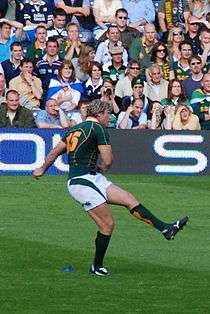 Percy Montgomery holds the South African record for test points. South Africa's most capped player is Victor Matfield with 127 caps.[106] The most-capped back is Percy Montgomery. Montgomery also holds the South African record for Test points with 893, which at the time of his international retirement placed him sixth on the all-time list of Test point scorers (he now stands ninth).[107] John Smit was the world's most-capped captain, having captained South Africa in 82 of his 110 Tests, but has since been overtaken.[108][109] Smit also played a record 46 consecutive matches for South Africa. The record try scorer is Bryan Habana with 64 tries. (as at 8 October 2015)[107][110] Hall of Fame playersEleven former South African international players have been inducted into either the International Rugby Hall of Fame or the IRB Hall of Fame. Six are members of the International Rugby Hall of Fame only; two are members of the IRB Hall of Fame only, and four are members of both Halls of Fame.
CoachesCurrent coaching staffThe current coaching staff of the South African national team was revealed on 12 April 2016:[111][112]
Former coachesThe role and definition of the South Africa coach has varied significantly over the team's history. Hence a comprehensive list of coaches, or head selectors, is impossible. The following table is a list of coaches since the 1949 All Blacks tour to South Africa. Both World Cup-winning coaches, Christie and White, were inducted into the IRB Hall of Fame in 2011 alongside all other World Cup-winning head coaches through the 2007 edition.[113]
ToursTraditionally, most of the test matches (and all until 1987) against other countries happened during tours. The first team to visit South Africa, was the British Lions in 1891. The first Springbok overseas tour was arranged in 1906–07 to Europe. See also
ReferencesBibliography
Notes
Sources
External links
| |||||||||||||||||||||||||||||||||||||||||||||||||||||||||||||||||||||||||||||||||||||||||||||||||||||||||||||||||||||||||||||||||||||||||||||||||||||||||||||||||||||||||||||||||||||||||||||||||||||||||||||||||||||||||||||||||||||||||||||||||||||||||||||||||||||||||||||||||||||||||||